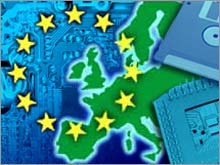|
Why tech IPOs are moving to Europe
Thanks to stock-market regulations here, startups seeking cash from investors have become the latest U.S. export.
SAN FRANCISCO (Business 2.0 Magazine) - The U.S. tech-IPO market may be the latest victim of overzealous regulation. Startups around the world used to head to the Nasdaq when they wanted to go public. But since the passage of the Sarbanes-Oxley Act in 2002, which imposes stringent regulations on publicly traded companies in the U.S., the action is moving offshore - and even U.S. companies are listing themselves on foreign stock exchanges.
The trend could heat up the European stock market - and make it tougher for U.S. investors to jump into hot tech offerings. It's also posing enough of a challenge to U.S. stock exchanges that both the New York Stock Exchange and the Nasdaq are seeking to buy European stock-market operators. In 2005, 19 U.S.-based companies went public on the London Stock Exchange's Alternative Investment Market (AIM), raising $2.1 billion. But the AIM also attracted tech companies from countries like Australia, China, India, Israel, and Russia. "You are getting a lot of companies out of Eastern Europe, Russia in particular, that don't want to come to the U.S. because of Sarbanes-Oxley regulations," says Allan Nichols, an equity analyst with Morningstar specializing in international telecom companies. Nichols notes that more than half of Eastern European companies and more than 90 percent of Russian companies going public have gone to London to list their shares. "These are deals that would previously have happened on Nasdaq," says Nichols. The costs of Sarbanes-Oxley
It's not that startups want to skirt regulations - it's that Sarbanes-Oxley has requirements that are both vague and highly technical, requiring expensive consulting fees and specialized software. For a typical company, the costs of compliance start at $3 million a year and go up over time. Although they were intended to prevent another Enron or WorldCom debacle, the rules have had the effect of discouraging smaller companies from going public. And there are other sound reasons for U.S. startups to head to Europe seeking capital. "Startups are global these days," says Danny Rimer, a London-based partner with European venture capital firm Index Ventures. "If you already have customers in Europe, and programmers doing development in Eastern Europe, it makes perfect sense to go public there." Billion-dollar deals for stock markets
The boom in European offerings is spurring the NYSE and the Nasdaq to act. The Nasdaq has already spent $1.4 billion on a 25 percent stake in the London Stock Exchange, and plans to bid for the rest in October. The NYSE, meanwhile, is seeking to buy Euronext, the owner of several smaller European stock markets, for $10 billion. Political opposition to the takeovers is likely to make both deals drag on. In the meantime, U.S. startups are likely to continue heading to Europe, where government officials are more supportive than in the U.S. In his first speech as the United Kingdom's Treasury Minister, Ed Balls recently said that regardless of who owns the London Stock Exchange, it should continue to be governed by a "light touch." European listings have one big disadvantage over the U.S.: a lack of liquidity, which discourages conservative investors from jumping into the market for fear they won't be able to get out if prices crash. Ultimately, if the NYSE and Nasdaq bids do succeed, the American exchanges could lower trading costs and bring much-needed volume to the European markets. And trans-Atlantic markets would make it easier for tech startups to go public, choosing the regulatory regime that best suits them. There is a chance it could all go terribly wrong. Let's not forget Pets.com and other problem children of the dot-com bubble, which the Nasdaq welcomed with open arms not so long ago. Investors will need to proceed with caution to make sure venture capitalists don't start dumping ailing startups on these "light touch" markets, with bankers and entrepreneurs playing along. "You need to get these three parties to behave well," says Rimer, the London-based venture capitalist. "It may be a tall order, but if it's accomplished we could see something like the AIM becoming what the Nasdaq was back in the mid-'90s." In other words - a market for promising companies where investors actually made money, before the bubble started inflating. That's a nice concept. Too bad we'll have to take a European vacation to see it happen. |
|

